Developing Critical Thinking Report: Personal Values and Management
VerifiedAdded on 2023/04/20
|13
|3532
|481
Report
AI Summary
This report delves into the multifaceted concept of critical thinking, exploring the intricate relationships between personal values, beliefs, and attitudes. It begins by differentiating between these key concepts, highlighting their individual characteristics and how they collectively shape individual behavior. The report then analyzes the influence of these factors on the application of various management theories, such as those proposed by Henri Fayol, Max Weber, and Frederick Taylor, relevant to the role of an Assistant Head Teacher. It underscores how personal values and beliefs can affect the interpretation and implementation of these theories. The report further examines how these theories can be applied to enhance the practices within an educational setting. Overall, the report provides a comprehensive understanding of how critical thinking, personal values, and management theories intersect to influence behavior and leadership within professional contexts.
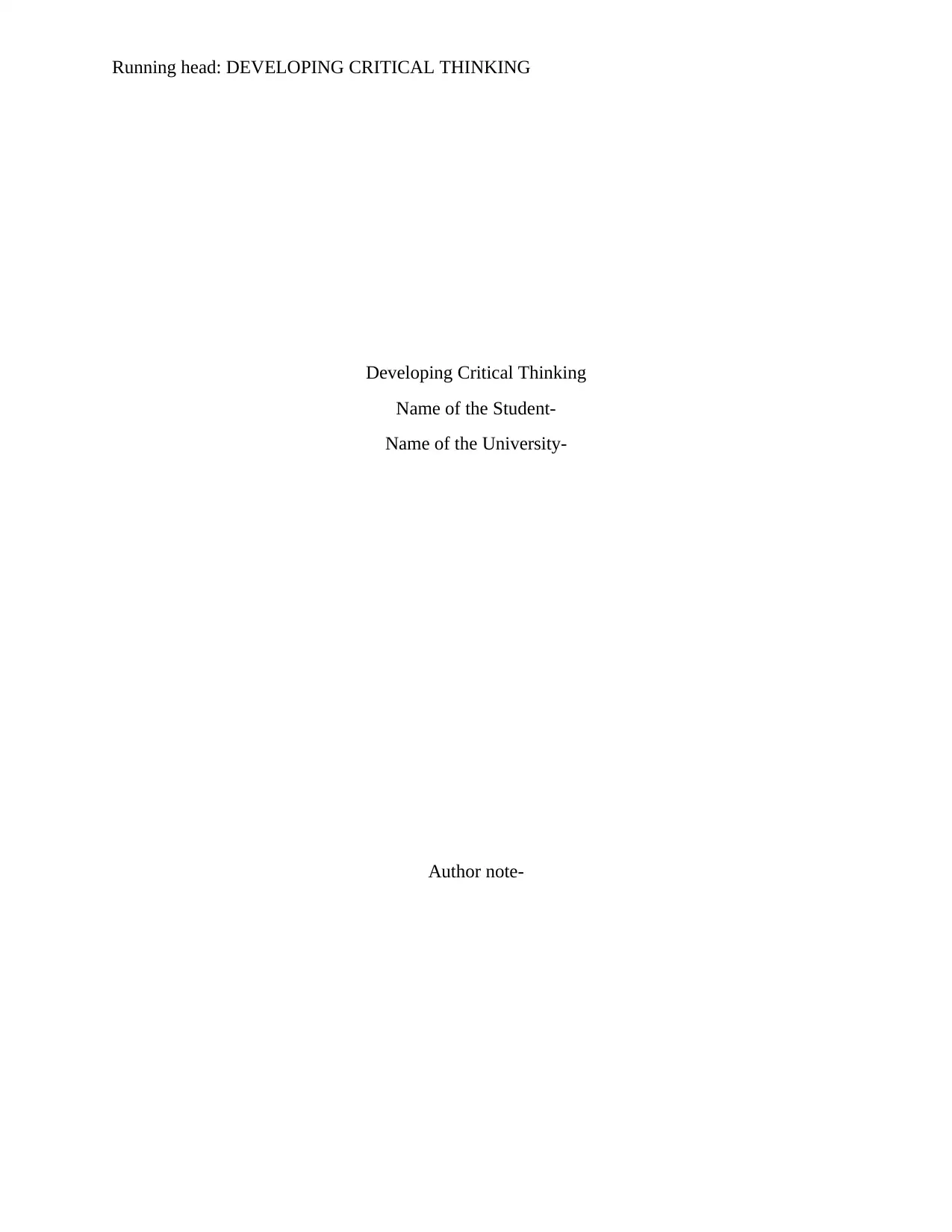
Running head: DEVELOPING CRITICAL THINKING
Developing Critical Thinking
Name of the Student-
Name of the University-
Author note-
Developing Critical Thinking
Name of the Student-
Name of the University-
Author note-
Paraphrase This Document
Need a fresh take? Get an instant paraphrase of this document with our AI Paraphraser
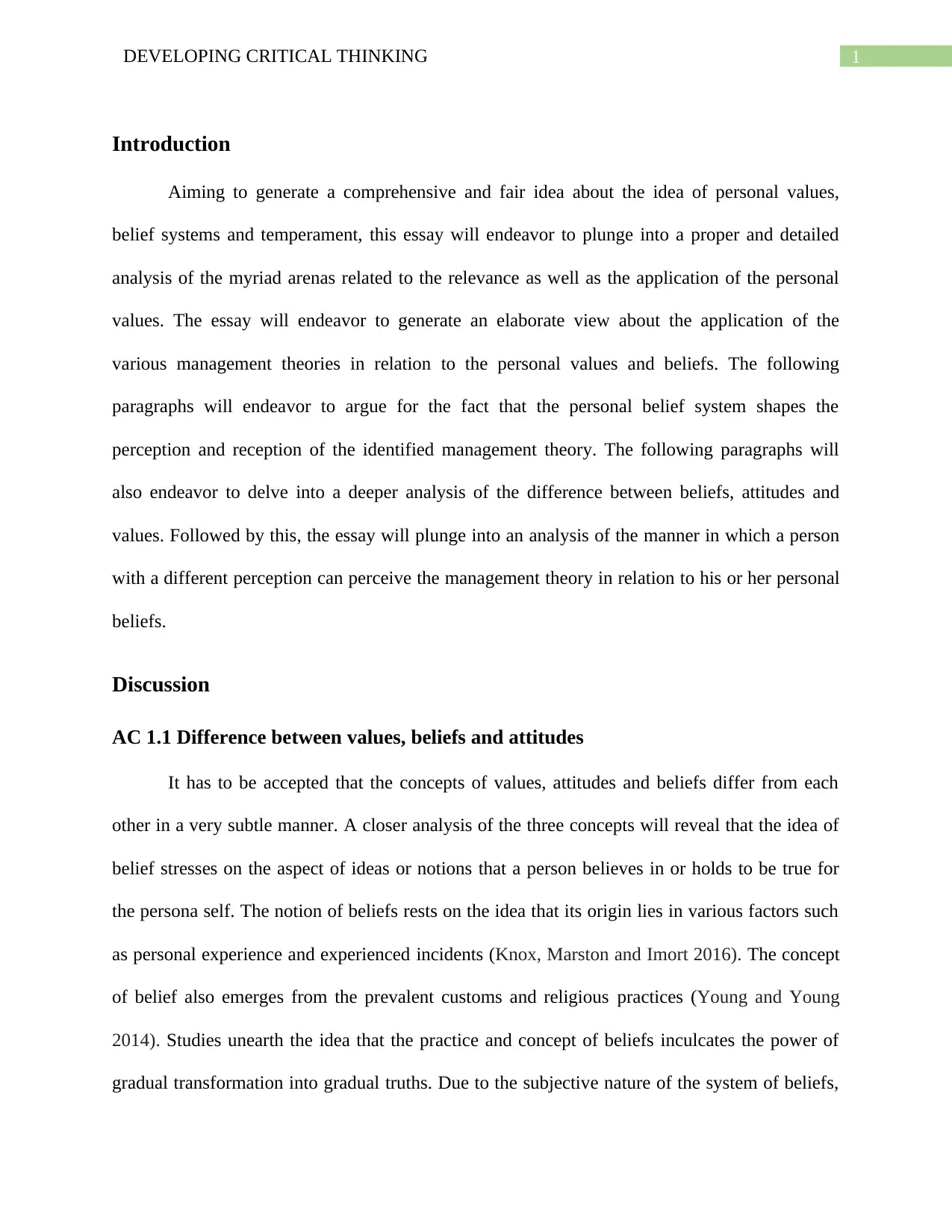
1DEVELOPING CRITICAL THINKING
Introduction
Aiming to generate a comprehensive and fair idea about the idea of personal values,
belief systems and temperament, this essay will endeavor to plunge into a proper and detailed
analysis of the myriad arenas related to the relevance as well as the application of the personal
values. The essay will endeavor to generate an elaborate view about the application of the
various management theories in relation to the personal values and beliefs. The following
paragraphs will endeavor to argue for the fact that the personal belief system shapes the
perception and reception of the identified management theory. The following paragraphs will
also endeavor to delve into a deeper analysis of the difference between beliefs, attitudes and
values. Followed by this, the essay will plunge into an analysis of the manner in which a person
with a different perception can perceive the management theory in relation to his or her personal
beliefs.
Discussion
AC 1.1 Difference between values, beliefs and attitudes
It has to be accepted that the concepts of values, attitudes and beliefs differ from each
other in a very subtle manner. A closer analysis of the three concepts will reveal that the idea of
belief stresses on the aspect of ideas or notions that a person believes in or holds to be true for
the persona self. The notion of beliefs rests on the idea that its origin lies in various factors such
as personal experience and experienced incidents (Knox, Marston and Imort 2016). The concept
of belief also emerges from the prevalent customs and religious practices (Young and Young
2014). Studies unearth the idea that the practice and concept of beliefs inculcates the power of
gradual transformation into gradual truths. Due to the subjective nature of the system of beliefs,
Introduction
Aiming to generate a comprehensive and fair idea about the idea of personal values,
belief systems and temperament, this essay will endeavor to plunge into a proper and detailed
analysis of the myriad arenas related to the relevance as well as the application of the personal
values. The essay will endeavor to generate an elaborate view about the application of the
various management theories in relation to the personal values and beliefs. The following
paragraphs will endeavor to argue for the fact that the personal belief system shapes the
perception and reception of the identified management theory. The following paragraphs will
also endeavor to delve into a deeper analysis of the difference between beliefs, attitudes and
values. Followed by this, the essay will plunge into an analysis of the manner in which a person
with a different perception can perceive the management theory in relation to his or her personal
beliefs.
Discussion
AC 1.1 Difference between values, beliefs and attitudes
It has to be accepted that the concepts of values, attitudes and beliefs differ from each
other in a very subtle manner. A closer analysis of the three concepts will reveal that the idea of
belief stresses on the aspect of ideas or notions that a person believes in or holds to be true for
the persona self. The notion of beliefs rests on the idea that its origin lies in various factors such
as personal experience and experienced incidents (Knox, Marston and Imort 2016). The concept
of belief also emerges from the prevalent customs and religious practices (Young and Young
2014). Studies unearth the idea that the practice and concept of beliefs inculcates the power of
gradual transformation into gradual truths. Due to the subjective nature of the system of beliefs,
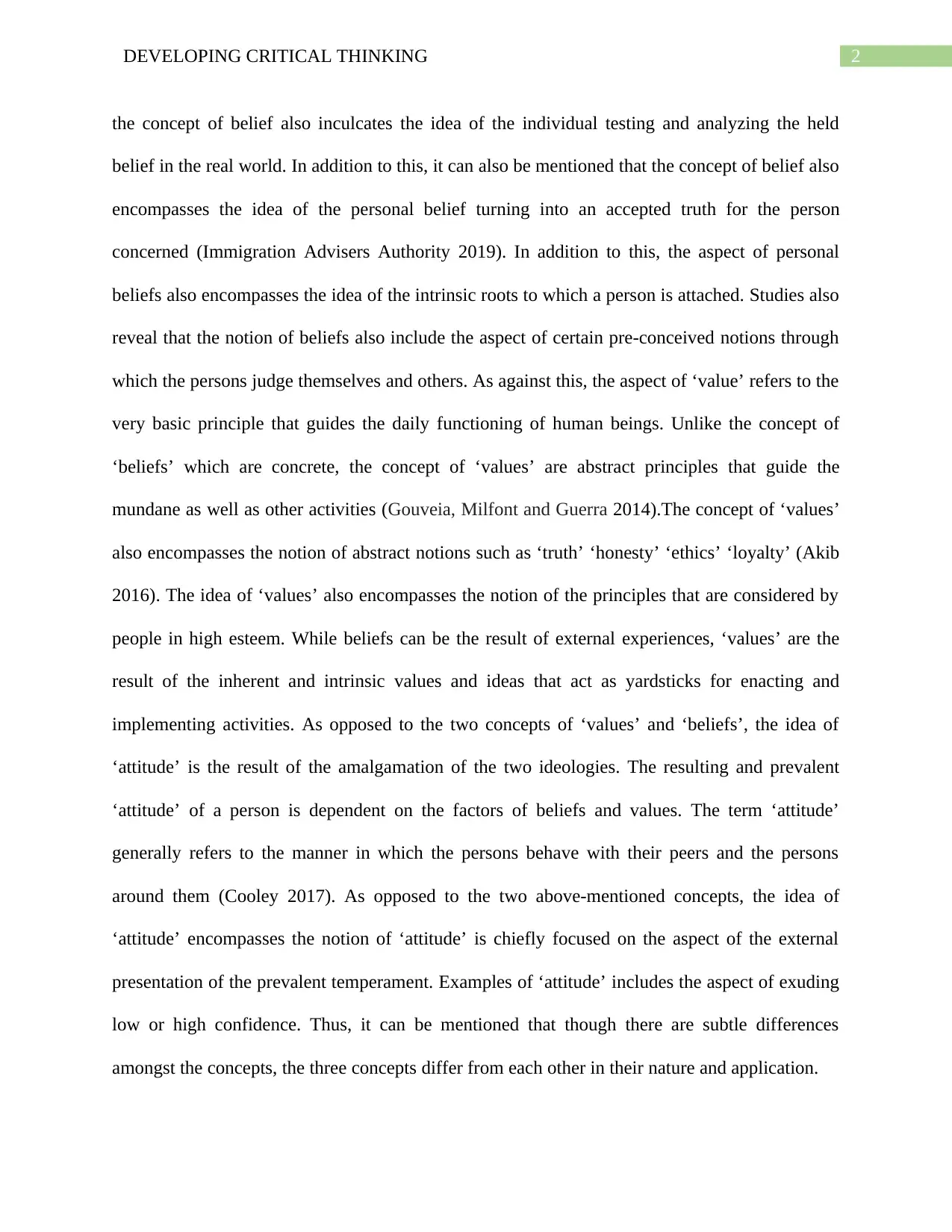
2DEVELOPING CRITICAL THINKING
the concept of belief also inculcates the idea of the individual testing and analyzing the held
belief in the real world. In addition to this, it can also be mentioned that the concept of belief also
encompasses the idea of the personal belief turning into an accepted truth for the person
concerned (Immigration Advisers Authority 2019). In addition to this, the aspect of personal
beliefs also encompasses the idea of the intrinsic roots to which a person is attached. Studies also
reveal that the notion of beliefs also include the aspect of certain pre-conceived notions through
which the persons judge themselves and others. As against this, the aspect of ‘value’ refers to the
very basic principle that guides the daily functioning of human beings. Unlike the concept of
‘beliefs’ which are concrete, the concept of ‘values’ are abstract principles that guide the
mundane as well as other activities (Gouveia, Milfont and Guerra 2014).The concept of ‘values’
also encompasses the notion of abstract notions such as ‘truth’ ‘honesty’ ‘ethics’ ‘loyalty’ (Akib
2016). The idea of ‘values’ also encompasses the notion of the principles that are considered by
people in high esteem. While beliefs can be the result of external experiences, ‘values’ are the
result of the inherent and intrinsic values and ideas that act as yardsticks for enacting and
implementing activities. As opposed to the two concepts of ‘values’ and ‘beliefs’, the idea of
‘attitude’ is the result of the amalgamation of the two ideologies. The resulting and prevalent
‘attitude’ of a person is dependent on the factors of beliefs and values. The term ‘attitude’
generally refers to the manner in which the persons behave with their peers and the persons
around them (Cooley 2017). As opposed to the two above-mentioned concepts, the idea of
‘attitude’ encompasses the notion of ‘attitude’ is chiefly focused on the aspect of the external
presentation of the prevalent temperament. Examples of ‘attitude’ includes the aspect of exuding
low or high confidence. Thus, it can be mentioned that though there are subtle differences
amongst the concepts, the three concepts differ from each other in their nature and application.
the concept of belief also inculcates the idea of the individual testing and analyzing the held
belief in the real world. In addition to this, it can also be mentioned that the concept of belief also
encompasses the idea of the personal belief turning into an accepted truth for the person
concerned (Immigration Advisers Authority 2019). In addition to this, the aspect of personal
beliefs also encompasses the idea of the intrinsic roots to which a person is attached. Studies also
reveal that the notion of beliefs also include the aspect of certain pre-conceived notions through
which the persons judge themselves and others. As against this, the aspect of ‘value’ refers to the
very basic principle that guides the daily functioning of human beings. Unlike the concept of
‘beliefs’ which are concrete, the concept of ‘values’ are abstract principles that guide the
mundane as well as other activities (Gouveia, Milfont and Guerra 2014).The concept of ‘values’
also encompasses the notion of abstract notions such as ‘truth’ ‘honesty’ ‘ethics’ ‘loyalty’ (Akib
2016). The idea of ‘values’ also encompasses the notion of the principles that are considered by
people in high esteem. While beliefs can be the result of external experiences, ‘values’ are the
result of the inherent and intrinsic values and ideas that act as yardsticks for enacting and
implementing activities. As opposed to the two concepts of ‘values’ and ‘beliefs’, the idea of
‘attitude’ is the result of the amalgamation of the two ideologies. The resulting and prevalent
‘attitude’ of a person is dependent on the factors of beliefs and values. The term ‘attitude’
generally refers to the manner in which the persons behave with their peers and the persons
around them (Cooley 2017). As opposed to the two above-mentioned concepts, the idea of
‘attitude’ encompasses the notion of ‘attitude’ is chiefly focused on the aspect of the external
presentation of the prevalent temperament. Examples of ‘attitude’ includes the aspect of exuding
low or high confidence. Thus, it can be mentioned that though there are subtle differences
amongst the concepts, the three concepts differ from each other in their nature and application.
⊘ This is a preview!⊘
Do you want full access?
Subscribe today to unlock all pages.

Trusted by 1+ million students worldwide
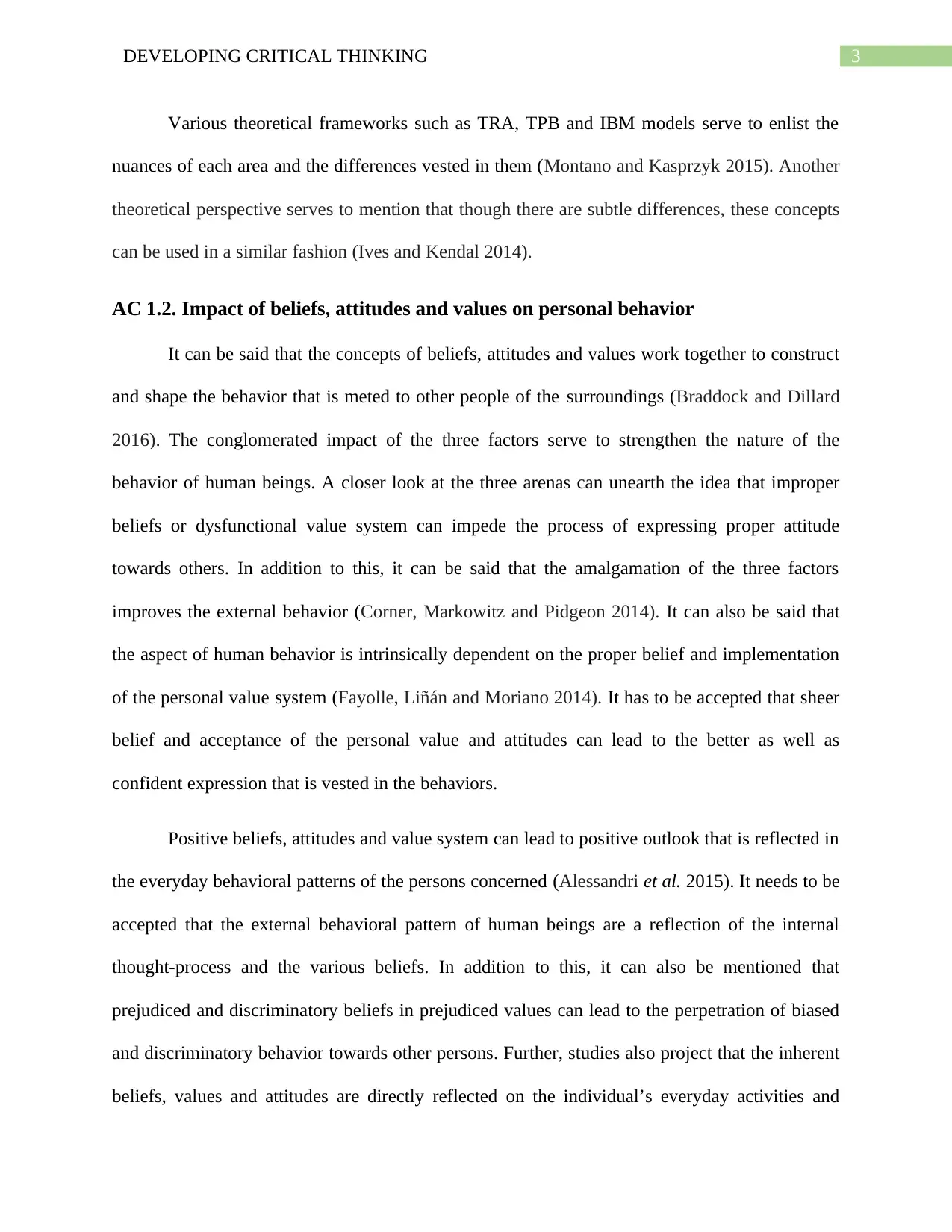
3DEVELOPING CRITICAL THINKING
Various theoretical frameworks such as TRA, TPB and IBM models serve to enlist the
nuances of each area and the differences vested in them (Montano and Kasprzyk 2015). Another
theoretical perspective serves to mention that though there are subtle differences, these concepts
can be used in a similar fashion (Ives and Kendal 2014).
AC 1.2. Impact of beliefs, attitudes and values on personal behavior
It can be said that the concepts of beliefs, attitudes and values work together to construct
and shape the behavior that is meted to other people of the surroundings (Braddock and Dillard
2016). The conglomerated impact of the three factors serve to strengthen the nature of the
behavior of human beings. A closer look at the three arenas can unearth the idea that improper
beliefs or dysfunctional value system can impede the process of expressing proper attitude
towards others. In addition to this, it can be said that the amalgamation of the three factors
improves the external behavior (Corner, Markowitz and Pidgeon 2014). It can also be said that
the aspect of human behavior is intrinsically dependent on the proper belief and implementation
of the personal value system (Fayolle, Liñán and Moriano 2014). It has to be accepted that sheer
belief and acceptance of the personal value and attitudes can lead to the better as well as
confident expression that is vested in the behaviors.
Positive beliefs, attitudes and value system can lead to positive outlook that is reflected in
the everyday behavioral patterns of the persons concerned (Alessandri et al. 2015). It needs to be
accepted that the external behavioral pattern of human beings are a reflection of the internal
thought-process and the various beliefs. In addition to this, it can also be mentioned that
prejudiced and discriminatory beliefs in prejudiced values can lead to the perpetration of biased
and discriminatory behavior towards other persons. Further, studies also project that the inherent
beliefs, values and attitudes are directly reflected on the individual’s everyday activities and
Various theoretical frameworks such as TRA, TPB and IBM models serve to enlist the
nuances of each area and the differences vested in them (Montano and Kasprzyk 2015). Another
theoretical perspective serves to mention that though there are subtle differences, these concepts
can be used in a similar fashion (Ives and Kendal 2014).
AC 1.2. Impact of beliefs, attitudes and values on personal behavior
It can be said that the concepts of beliefs, attitudes and values work together to construct
and shape the behavior that is meted to other people of the surroundings (Braddock and Dillard
2016). The conglomerated impact of the three factors serve to strengthen the nature of the
behavior of human beings. A closer look at the three arenas can unearth the idea that improper
beliefs or dysfunctional value system can impede the process of expressing proper attitude
towards others. In addition to this, it can be said that the amalgamation of the three factors
improves the external behavior (Corner, Markowitz and Pidgeon 2014). It can also be said that
the aspect of human behavior is intrinsically dependent on the proper belief and implementation
of the personal value system (Fayolle, Liñán and Moriano 2014). It has to be accepted that sheer
belief and acceptance of the personal value and attitudes can lead to the better as well as
confident expression that is vested in the behaviors.
Positive beliefs, attitudes and value system can lead to positive outlook that is reflected in
the everyday behavioral patterns of the persons concerned (Alessandri et al. 2015). It needs to be
accepted that the external behavioral pattern of human beings are a reflection of the internal
thought-process and the various beliefs. In addition to this, it can also be mentioned that
prejudiced and discriminatory beliefs in prejudiced values can lead to the perpetration of biased
and discriminatory behavior towards other persons. Further, studies also project that the inherent
beliefs, values and attitudes are directly reflected on the individual’s everyday activities and
Paraphrase This Document
Need a fresh take? Get an instant paraphrase of this document with our AI Paraphraser
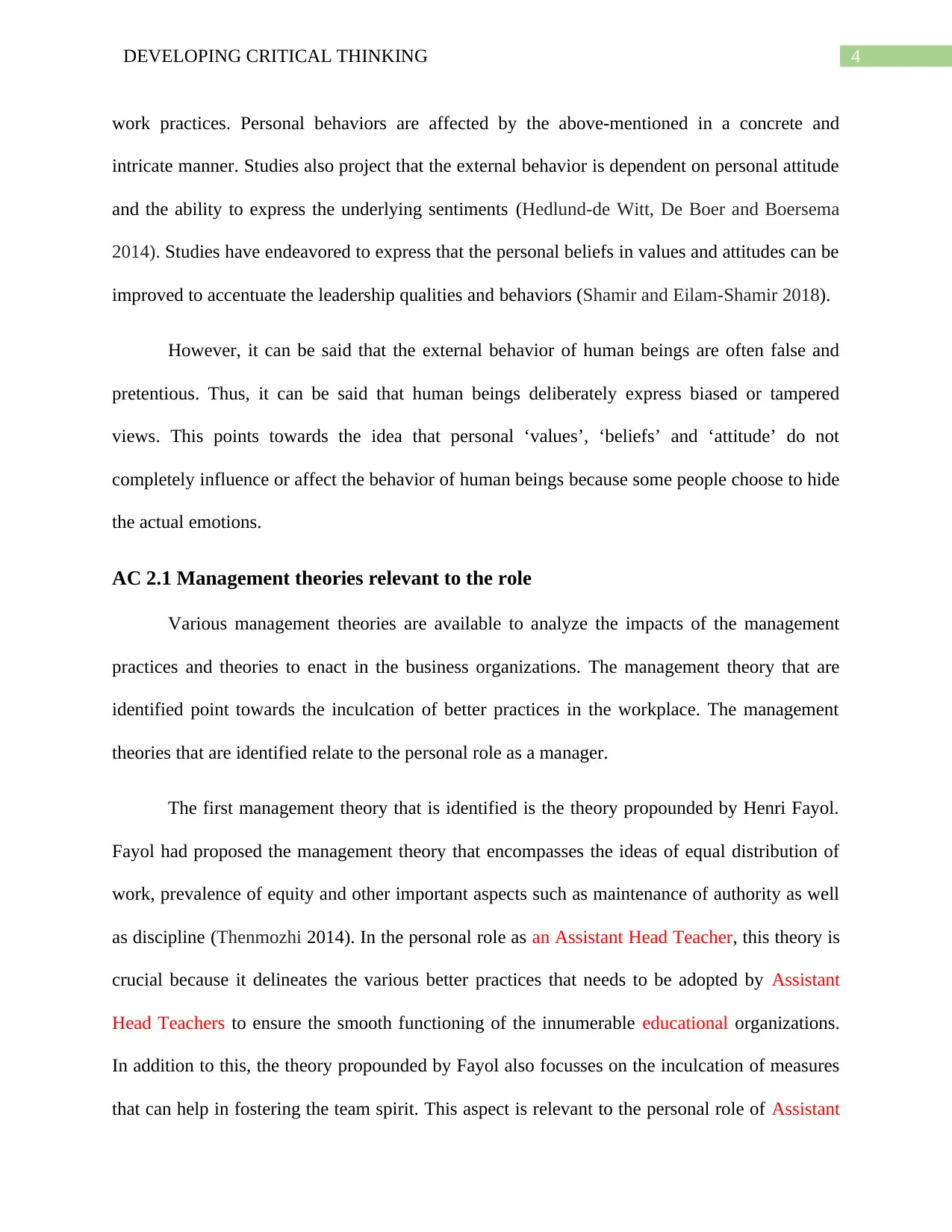
4DEVELOPING CRITICAL THINKING
work practices. Personal behaviors are affected by the above-mentioned in a concrete and
intricate manner. Studies also project that the external behavior is dependent on personal attitude
and the ability to express the underlying sentiments (Hedlund-de Witt, De Boer and Boersema
2014). Studies have endeavored to express that the personal beliefs in values and attitudes can be
improved to accentuate the leadership qualities and behaviors (Shamir and Eilam-Shamir 2018).
However, it can be said that the external behavior of human beings are often false and
pretentious. Thus, it can be said that human beings deliberately express biased or tampered
views. This points towards the idea that personal ‘values’, ‘beliefs’ and ‘attitude’ do not
completely influence or affect the behavior of human beings because some people choose to hide
the actual emotions.
AC 2.1 Management theories relevant to the role
Various management theories are available to analyze the impacts of the management
practices and theories to enact in the business organizations. The management theory that are
identified point towards the inculcation of better practices in the workplace. The management
theories that are identified relate to the personal role as a manager.
The first management theory that is identified is the theory propounded by Henri Fayol.
Fayol had proposed the management theory that encompasses the ideas of equal distribution of
work, prevalence of equity and other important aspects such as maintenance of authority as well
as discipline (Thenmozhi 2014). In the personal role as an Assistant Head Teacher, this theory is
crucial because it delineates the various better practices that needs to be adopted by Assistant
Head Teachers to ensure the smooth functioning of the innumerable educational organizations.
In addition to this, the theory propounded by Fayol also focusses on the inculcation of measures
that can help in fostering the team spirit. This aspect is relevant to the personal role of Assistant
work practices. Personal behaviors are affected by the above-mentioned in a concrete and
intricate manner. Studies also project that the external behavior is dependent on personal attitude
and the ability to express the underlying sentiments (Hedlund-de Witt, De Boer and Boersema
2014). Studies have endeavored to express that the personal beliefs in values and attitudes can be
improved to accentuate the leadership qualities and behaviors (Shamir and Eilam-Shamir 2018).
However, it can be said that the external behavior of human beings are often false and
pretentious. Thus, it can be said that human beings deliberately express biased or tampered
views. This points towards the idea that personal ‘values’, ‘beliefs’ and ‘attitude’ do not
completely influence or affect the behavior of human beings because some people choose to hide
the actual emotions.
AC 2.1 Management theories relevant to the role
Various management theories are available to analyze the impacts of the management
practices and theories to enact in the business organizations. The management theory that are
identified point towards the inculcation of better practices in the workplace. The management
theories that are identified relate to the personal role as a manager.
The first management theory that is identified is the theory propounded by Henri Fayol.
Fayol had proposed the management theory that encompasses the ideas of equal distribution of
work, prevalence of equity and other important aspects such as maintenance of authority as well
as discipline (Thenmozhi 2014). In the personal role as an Assistant Head Teacher, this theory is
crucial because it delineates the various better practices that needs to be adopted by Assistant
Head Teachers to ensure the smooth functioning of the innumerable educational organizations.
In addition to this, the theory propounded by Fayol also focusses on the inculcation of measures
that can help in fostering the team spirit. This aspect is relevant to the personal role of Assistant
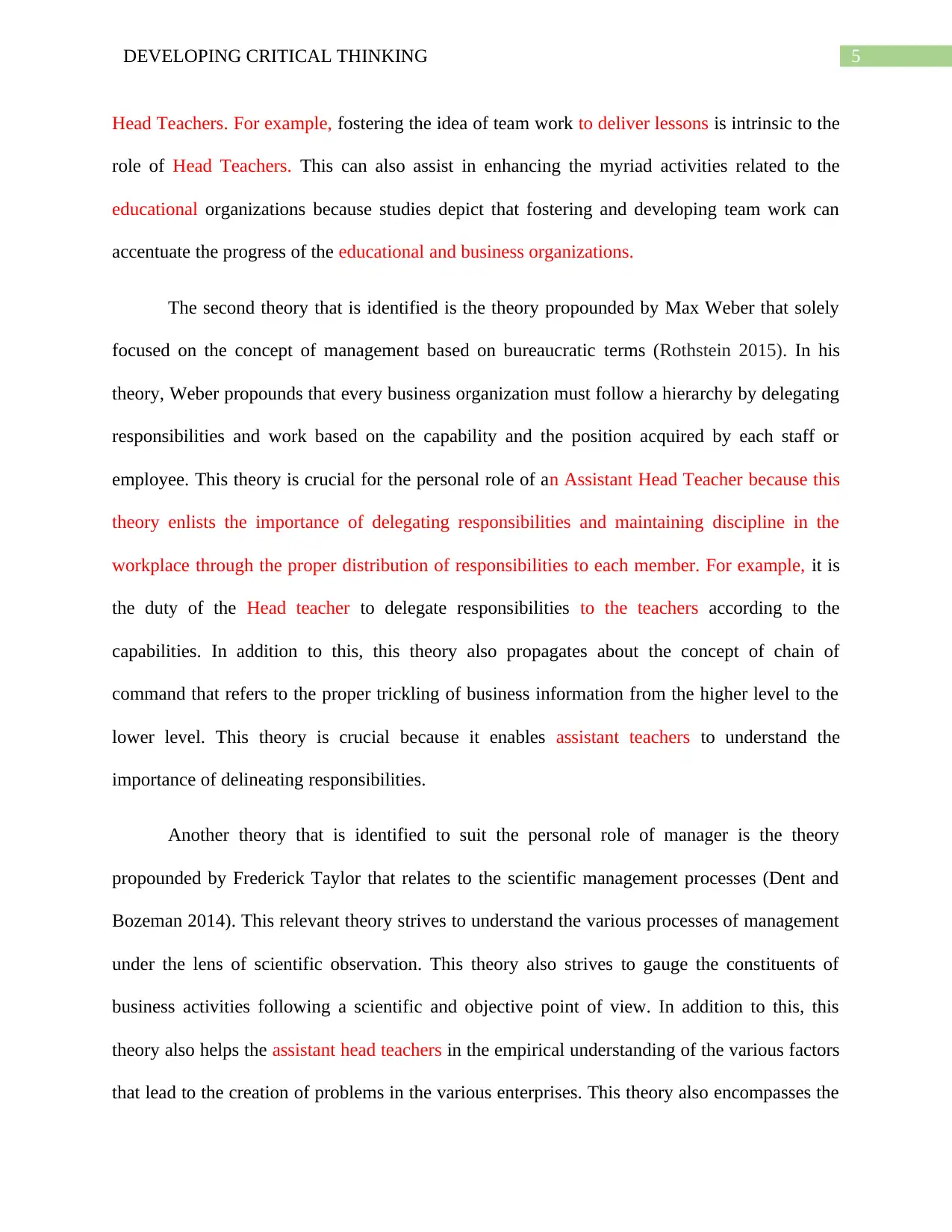
5DEVELOPING CRITICAL THINKING
Head Teachers. For example, fostering the idea of team work to deliver lessons is intrinsic to the
role of Head Teachers. This can also assist in enhancing the myriad activities related to the
educational organizations because studies depict that fostering and developing team work can
accentuate the progress of the educational and business organizations.
The second theory that is identified is the theory propounded by Max Weber that solely
focused on the concept of management based on bureaucratic terms (Rothstein 2015). In his
theory, Weber propounds that every business organization must follow a hierarchy by delegating
responsibilities and work based on the capability and the position acquired by each staff or
employee. This theory is crucial for the personal role of an Assistant Head Teacher because this
theory enlists the importance of delegating responsibilities and maintaining discipline in the
workplace through the proper distribution of responsibilities to each member. For example, it is
the duty of the Head teacher to delegate responsibilities to the teachers according to the
capabilities. In addition to this, this theory also propagates about the concept of chain of
command that refers to the proper trickling of business information from the higher level to the
lower level. This theory is crucial because it enables assistant teachers to understand the
importance of delineating responsibilities.
Another theory that is identified to suit the personal role of manager is the theory
propounded by Frederick Taylor that relates to the scientific management processes (Dent and
Bozeman 2014). This relevant theory strives to understand the various processes of management
under the lens of scientific observation. This theory also strives to gauge the constituents of
business activities following a scientific and objective point of view. In addition to this, this
theory also helps the assistant head teachers in the empirical understanding of the various factors
that lead to the creation of problems in the various enterprises. This theory also encompasses the
Head Teachers. For example, fostering the idea of team work to deliver lessons is intrinsic to the
role of Head Teachers. This can also assist in enhancing the myriad activities related to the
educational organizations because studies depict that fostering and developing team work can
accentuate the progress of the educational and business organizations.
The second theory that is identified is the theory propounded by Max Weber that solely
focused on the concept of management based on bureaucratic terms (Rothstein 2015). In his
theory, Weber propounds that every business organization must follow a hierarchy by delegating
responsibilities and work based on the capability and the position acquired by each staff or
employee. This theory is crucial for the personal role of an Assistant Head Teacher because this
theory enlists the importance of delegating responsibilities and maintaining discipline in the
workplace through the proper distribution of responsibilities to each member. For example, it is
the duty of the Head teacher to delegate responsibilities to the teachers according to the
capabilities. In addition to this, this theory also propagates about the concept of chain of
command that refers to the proper trickling of business information from the higher level to the
lower level. This theory is crucial because it enables assistant teachers to understand the
importance of delineating responsibilities.
Another theory that is identified to suit the personal role of manager is the theory
propounded by Frederick Taylor that relates to the scientific management processes (Dent and
Bozeman 2014). This relevant theory strives to understand the various processes of management
under the lens of scientific observation. This theory also strives to gauge the constituents of
business activities following a scientific and objective point of view. In addition to this, this
theory also helps the assistant head teachers in the empirical understanding of the various factors
that lead to the creation of problems in the various enterprises. This theory also encompasses the
⊘ This is a preview!⊘
Do you want full access?
Subscribe today to unlock all pages.

Trusted by 1+ million students worldwide
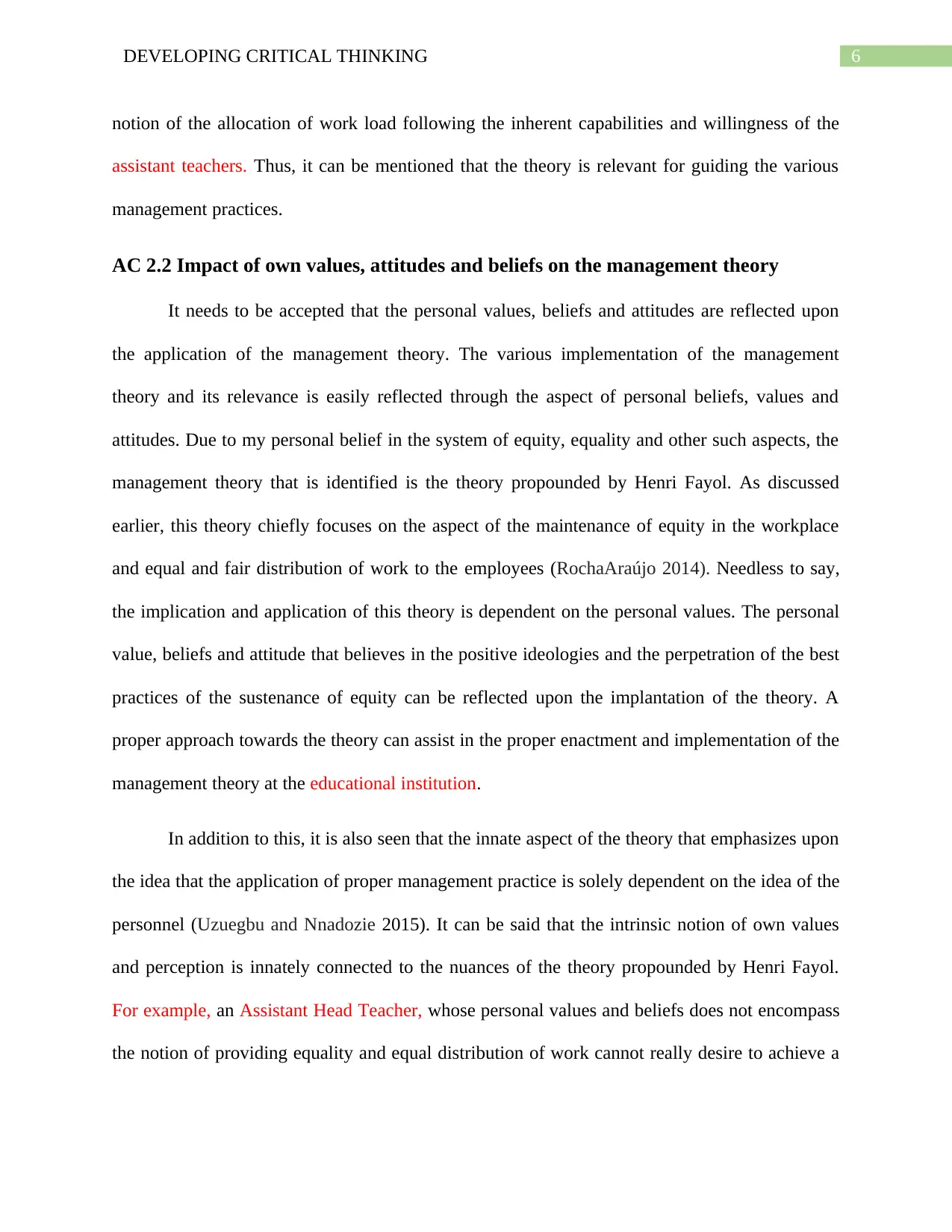
6DEVELOPING CRITICAL THINKING
notion of the allocation of work load following the inherent capabilities and willingness of the
assistant teachers. Thus, it can be mentioned that the theory is relevant for guiding the various
management practices.
AC 2.2 Impact of own values, attitudes and beliefs on the management theory
It needs to be accepted that the personal values, beliefs and attitudes are reflected upon
the application of the management theory. The various implementation of the management
theory and its relevance is easily reflected through the aspect of personal beliefs, values and
attitudes. Due to my personal belief in the system of equity, equality and other such aspects, the
management theory that is identified is the theory propounded by Henri Fayol. As discussed
earlier, this theory chiefly focuses on the aspect of the maintenance of equity in the workplace
and equal and fair distribution of work to the employees (RochaAraújo 2014). Needless to say,
the implication and application of this theory is dependent on the personal values. The personal
value, beliefs and attitude that believes in the positive ideologies and the perpetration of the best
practices of the sustenance of equity can be reflected upon the implantation of the theory. A
proper approach towards the theory can assist in the proper enactment and implementation of the
management theory at the educational institution.
In addition to this, it is also seen that the innate aspect of the theory that emphasizes upon
the idea that the application of proper management practice is solely dependent on the idea of the
personnel (Uzuegbu and Nnadozie 2015). It can be said that the intrinsic notion of own values
and perception is innately connected to the nuances of the theory propounded by Henri Fayol.
For example, an Assistant Head Teacher, whose personal values and beliefs does not encompass
the notion of providing equality and equal distribution of work cannot really desire to achieve a
notion of the allocation of work load following the inherent capabilities and willingness of the
assistant teachers. Thus, it can be mentioned that the theory is relevant for guiding the various
management practices.
AC 2.2 Impact of own values, attitudes and beliefs on the management theory
It needs to be accepted that the personal values, beliefs and attitudes are reflected upon
the application of the management theory. The various implementation of the management
theory and its relevance is easily reflected through the aspect of personal beliefs, values and
attitudes. Due to my personal belief in the system of equity, equality and other such aspects, the
management theory that is identified is the theory propounded by Henri Fayol. As discussed
earlier, this theory chiefly focuses on the aspect of the maintenance of equity in the workplace
and equal and fair distribution of work to the employees (RochaAraújo 2014). Needless to say,
the implication and application of this theory is dependent on the personal values. The personal
value, beliefs and attitude that believes in the positive ideologies and the perpetration of the best
practices of the sustenance of equity can be reflected upon the implantation of the theory. A
proper approach towards the theory can assist in the proper enactment and implementation of the
management theory at the educational institution.
In addition to this, it is also seen that the innate aspect of the theory that emphasizes upon
the idea that the application of proper management practice is solely dependent on the idea of the
personnel (Uzuegbu and Nnadozie 2015). It can be said that the intrinsic notion of own values
and perception is innately connected to the nuances of the theory propounded by Henri Fayol.
For example, an Assistant Head Teacher, whose personal values and beliefs does not encompass
the notion of providing equality and equal distribution of work cannot really desire to achieve a
Paraphrase This Document
Need a fresh take? Get an instant paraphrase of this document with our AI Paraphraser
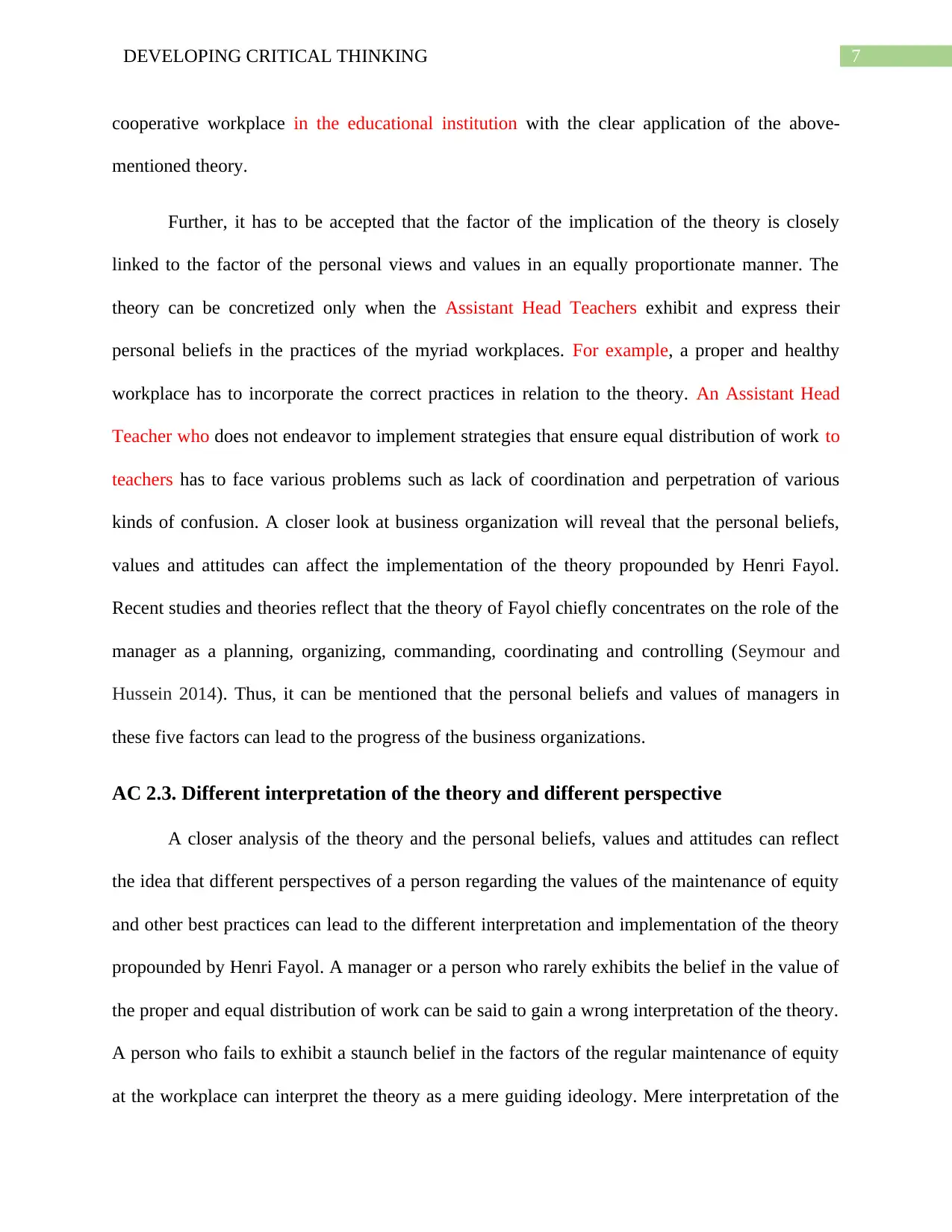
7DEVELOPING CRITICAL THINKING
cooperative workplace in the educational institution with the clear application of the above-
mentioned theory.
Further, it has to be accepted that the factor of the implication of the theory is closely
linked to the factor of the personal views and values in an equally proportionate manner. The
theory can be concretized only when the Assistant Head Teachers exhibit and express their
personal beliefs in the practices of the myriad workplaces. For example, a proper and healthy
workplace has to incorporate the correct practices in relation to the theory. An Assistant Head
Teacher who does not endeavor to implement strategies that ensure equal distribution of work to
teachers has to face various problems such as lack of coordination and perpetration of various
kinds of confusion. A closer look at business organization will reveal that the personal beliefs,
values and attitudes can affect the implementation of the theory propounded by Henri Fayol.
Recent studies and theories reflect that the theory of Fayol chiefly concentrates on the role of the
manager as a planning, organizing, commanding, coordinating and controlling (Seymour and
Hussein 2014). Thus, it can be mentioned that the personal beliefs and values of managers in
these five factors can lead to the progress of the business organizations.
AC 2.3. Different interpretation of the theory and different perspective
A closer analysis of the theory and the personal beliefs, values and attitudes can reflect
the idea that different perspectives of a person regarding the values of the maintenance of equity
and other best practices can lead to the different interpretation and implementation of the theory
propounded by Henri Fayol. A manager or a person who rarely exhibits the belief in the value of
the proper and equal distribution of work can be said to gain a wrong interpretation of the theory.
A person who fails to exhibit a staunch belief in the factors of the regular maintenance of equity
at the workplace can interpret the theory as a mere guiding ideology. Mere interpretation of the
cooperative workplace in the educational institution with the clear application of the above-
mentioned theory.
Further, it has to be accepted that the factor of the implication of the theory is closely
linked to the factor of the personal views and values in an equally proportionate manner. The
theory can be concretized only when the Assistant Head Teachers exhibit and express their
personal beliefs in the practices of the myriad workplaces. For example, a proper and healthy
workplace has to incorporate the correct practices in relation to the theory. An Assistant Head
Teacher who does not endeavor to implement strategies that ensure equal distribution of work to
teachers has to face various problems such as lack of coordination and perpetration of various
kinds of confusion. A closer look at business organization will reveal that the personal beliefs,
values and attitudes can affect the implementation of the theory propounded by Henri Fayol.
Recent studies and theories reflect that the theory of Fayol chiefly concentrates on the role of the
manager as a planning, organizing, commanding, coordinating and controlling (Seymour and
Hussein 2014). Thus, it can be mentioned that the personal beliefs and values of managers in
these five factors can lead to the progress of the business organizations.
AC 2.3. Different interpretation of the theory and different perspective
A closer analysis of the theory and the personal beliefs, values and attitudes can reflect
the idea that different perspectives of a person regarding the values of the maintenance of equity
and other best practices can lead to the different interpretation and implementation of the theory
propounded by Henri Fayol. A manager or a person who rarely exhibits the belief in the value of
the proper and equal distribution of work can be said to gain a wrong interpretation of the theory.
A person who fails to exhibit a staunch belief in the factors of the regular maintenance of equity
at the workplace can interpret the theory as a mere guiding ideology. Mere interpretation of the
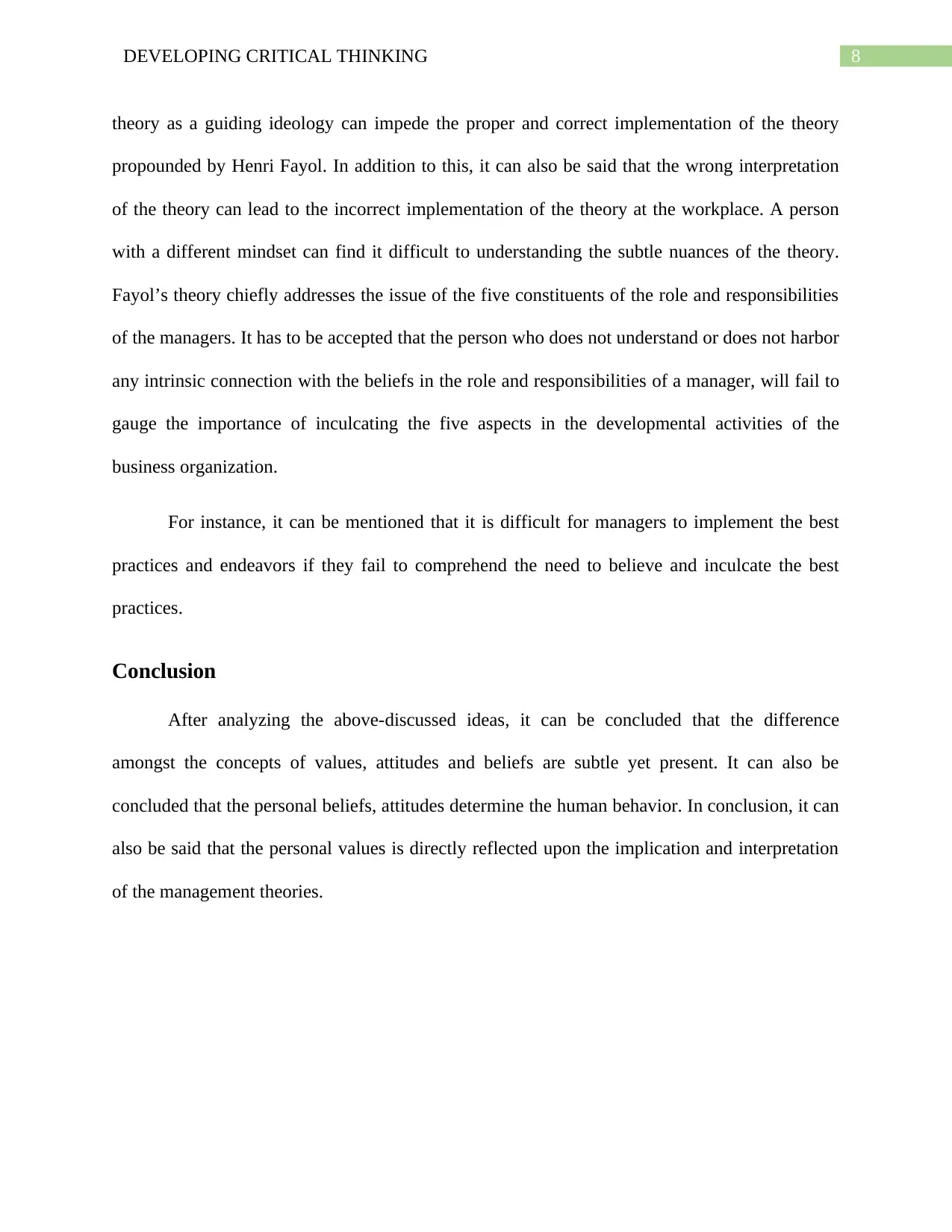
8DEVELOPING CRITICAL THINKING
theory as a guiding ideology can impede the proper and correct implementation of the theory
propounded by Henri Fayol. In addition to this, it can also be said that the wrong interpretation
of the theory can lead to the incorrect implementation of the theory at the workplace. A person
with a different mindset can find it difficult to understanding the subtle nuances of the theory.
Fayol’s theory chiefly addresses the issue of the five constituents of the role and responsibilities
of the managers. It has to be accepted that the person who does not understand or does not harbor
any intrinsic connection with the beliefs in the role and responsibilities of a manager, will fail to
gauge the importance of inculcating the five aspects in the developmental activities of the
business organization.
For instance, it can be mentioned that it is difficult for managers to implement the best
practices and endeavors if they fail to comprehend the need to believe and inculcate the best
practices.
Conclusion
After analyzing the above-discussed ideas, it can be concluded that the difference
amongst the concepts of values, attitudes and beliefs are subtle yet present. It can also be
concluded that the personal beliefs, attitudes determine the human behavior. In conclusion, it can
also be said that the personal values is directly reflected upon the implication and interpretation
of the management theories.
theory as a guiding ideology can impede the proper and correct implementation of the theory
propounded by Henri Fayol. In addition to this, it can also be said that the wrong interpretation
of the theory can lead to the incorrect implementation of the theory at the workplace. A person
with a different mindset can find it difficult to understanding the subtle nuances of the theory.
Fayol’s theory chiefly addresses the issue of the five constituents of the role and responsibilities
of the managers. It has to be accepted that the person who does not understand or does not harbor
any intrinsic connection with the beliefs in the role and responsibilities of a manager, will fail to
gauge the importance of inculcating the five aspects in the developmental activities of the
business organization.
For instance, it can be mentioned that it is difficult for managers to implement the best
practices and endeavors if they fail to comprehend the need to believe and inculcate the best
practices.
Conclusion
After analyzing the above-discussed ideas, it can be concluded that the difference
amongst the concepts of values, attitudes and beliefs are subtle yet present. It can also be
concluded that the personal beliefs, attitudes determine the human behavior. In conclusion, it can
also be said that the personal values is directly reflected upon the implication and interpretation
of the management theories.
⊘ This is a preview!⊘
Do you want full access?
Subscribe today to unlock all pages.

Trusted by 1+ million students worldwide
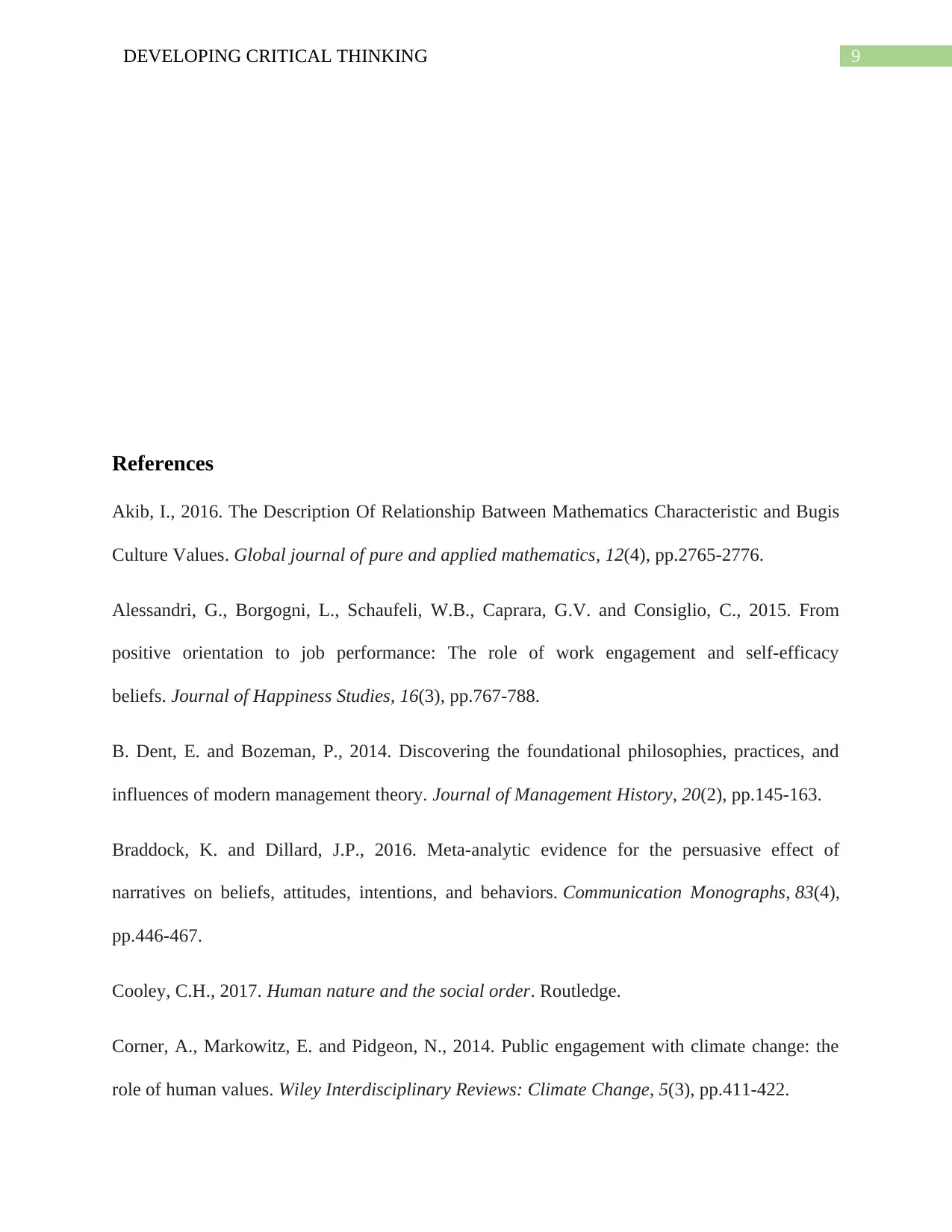
9DEVELOPING CRITICAL THINKING
References
Akib, I., 2016. The Description Of Relationship Batween Mathematics Characteristic and Bugis
Culture Values. Global journal of pure and applied mathematics, 12(4), pp.2765-2776.
Alessandri, G., Borgogni, L., Schaufeli, W.B., Caprara, G.V. and Consiglio, C., 2015. From
positive orientation to job performance: The role of work engagement and self-efficacy
beliefs. Journal of Happiness Studies, 16(3), pp.767-788.
B. Dent, E. and Bozeman, P., 2014. Discovering the foundational philosophies, practices, and
influences of modern management theory. Journal of Management History, 20(2), pp.145-163.
Braddock, K. and Dillard, J.P., 2016. Meta-analytic evidence for the persuasive effect of
narratives on beliefs, attitudes, intentions, and behaviors. Communication Monographs, 83(4),
pp.446-467.
Cooley, C.H., 2017. Human nature and the social order. Routledge.
Corner, A., Markowitz, E. and Pidgeon, N., 2014. Public engagement with climate change: the
role of human values. Wiley Interdisciplinary Reviews: Climate Change, 5(3), pp.411-422.
References
Akib, I., 2016. The Description Of Relationship Batween Mathematics Characteristic and Bugis
Culture Values. Global journal of pure and applied mathematics, 12(4), pp.2765-2776.
Alessandri, G., Borgogni, L., Schaufeli, W.B., Caprara, G.V. and Consiglio, C., 2015. From
positive orientation to job performance: The role of work engagement and self-efficacy
beliefs. Journal of Happiness Studies, 16(3), pp.767-788.
B. Dent, E. and Bozeman, P., 2014. Discovering the foundational philosophies, practices, and
influences of modern management theory. Journal of Management History, 20(2), pp.145-163.
Braddock, K. and Dillard, J.P., 2016. Meta-analytic evidence for the persuasive effect of
narratives on beliefs, attitudes, intentions, and behaviors. Communication Monographs, 83(4),
pp.446-467.
Cooley, C.H., 2017. Human nature and the social order. Routledge.
Corner, A., Markowitz, E. and Pidgeon, N., 2014. Public engagement with climate change: the
role of human values. Wiley Interdisciplinary Reviews: Climate Change, 5(3), pp.411-422.
Paraphrase This Document
Need a fresh take? Get an instant paraphrase of this document with our AI Paraphraser
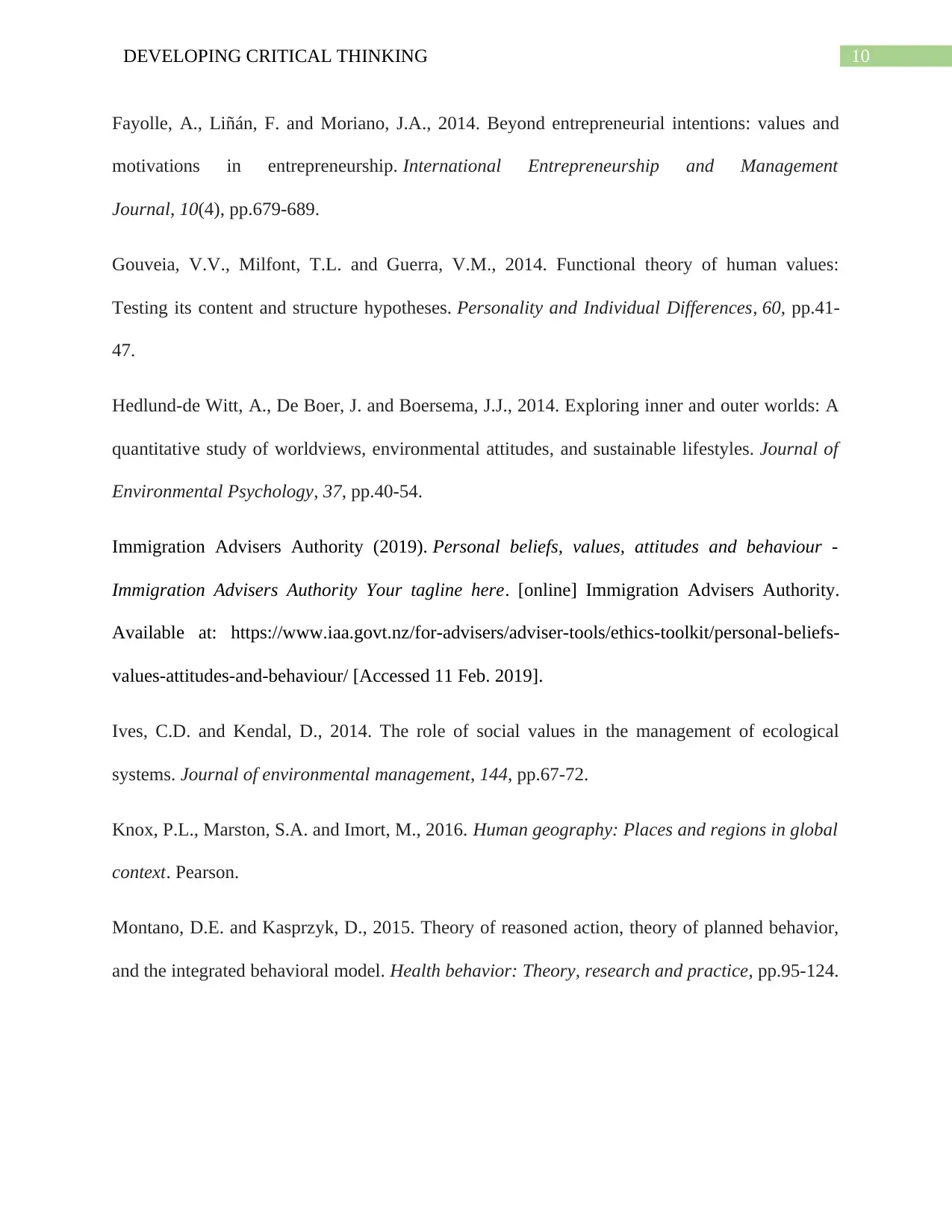
10DEVELOPING CRITICAL THINKING
Fayolle, A., Liñán, F. and Moriano, J.A., 2014. Beyond entrepreneurial intentions: values and
motivations in entrepreneurship. International Entrepreneurship and Management
Journal, 10(4), pp.679-689.
Gouveia, V.V., Milfont, T.L. and Guerra, V.M., 2014. Functional theory of human values:
Testing its content and structure hypotheses. Personality and Individual Differences, 60, pp.41-
47.
Hedlund-de Witt, A., De Boer, J. and Boersema, J.J., 2014. Exploring inner and outer worlds: A
quantitative study of worldviews, environmental attitudes, and sustainable lifestyles. Journal of
Environmental Psychology, 37, pp.40-54.
Immigration Advisers Authority (2019). Personal beliefs, values, attitudes and behaviour -
Immigration Advisers Authority Your tagline here. [online] Immigration Advisers Authority.
Available at: https://www.iaa.govt.nz/for-advisers/adviser-tools/ethics-toolkit/personal-beliefs-
values-attitudes-and-behaviour/ [Accessed 11 Feb. 2019].
Ives, C.D. and Kendal, D., 2014. The role of social values in the management of ecological
systems. Journal of environmental management, 144, pp.67-72.
Knox, P.L., Marston, S.A. and Imort, M., 2016. Human geography: Places and regions in global
context. Pearson.
Montano, D.E. and Kasprzyk, D., 2015. Theory of reasoned action, theory of planned behavior,
and the integrated behavioral model. Health behavior: Theory, research and practice, pp.95-124.
Fayolle, A., Liñán, F. and Moriano, J.A., 2014. Beyond entrepreneurial intentions: values and
motivations in entrepreneurship. International Entrepreneurship and Management
Journal, 10(4), pp.679-689.
Gouveia, V.V., Milfont, T.L. and Guerra, V.M., 2014. Functional theory of human values:
Testing its content and structure hypotheses. Personality and Individual Differences, 60, pp.41-
47.
Hedlund-de Witt, A., De Boer, J. and Boersema, J.J., 2014. Exploring inner and outer worlds: A
quantitative study of worldviews, environmental attitudes, and sustainable lifestyles. Journal of
Environmental Psychology, 37, pp.40-54.
Immigration Advisers Authority (2019). Personal beliefs, values, attitudes and behaviour -
Immigration Advisers Authority Your tagline here. [online] Immigration Advisers Authority.
Available at: https://www.iaa.govt.nz/for-advisers/adviser-tools/ethics-toolkit/personal-beliefs-
values-attitudes-and-behaviour/ [Accessed 11 Feb. 2019].
Ives, C.D. and Kendal, D., 2014. The role of social values in the management of ecological
systems. Journal of environmental management, 144, pp.67-72.
Knox, P.L., Marston, S.A. and Imort, M., 2016. Human geography: Places and regions in global
context. Pearson.
Montano, D.E. and Kasprzyk, D., 2015. Theory of reasoned action, theory of planned behavior,
and the integrated behavioral model. Health behavior: Theory, research and practice, pp.95-124.
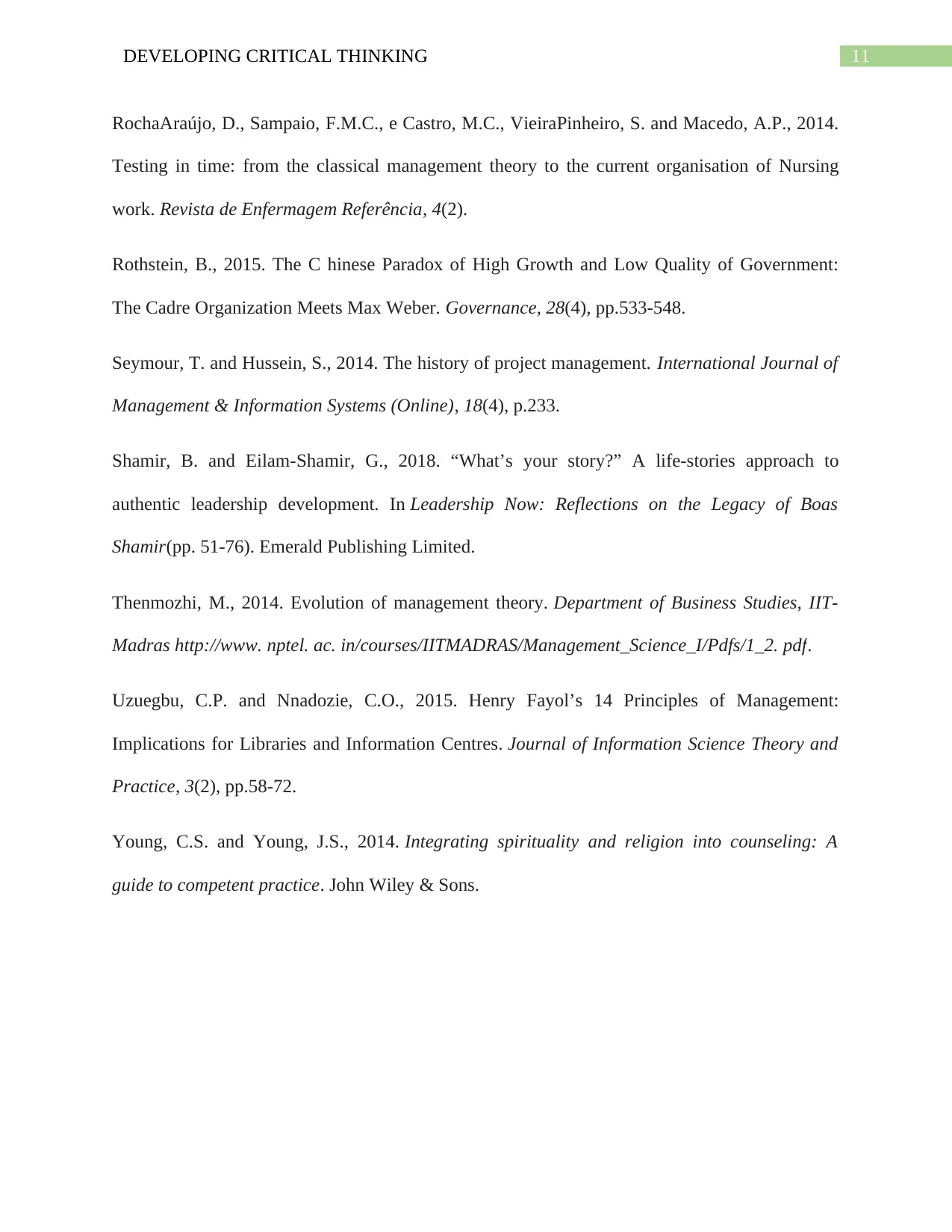
11DEVELOPING CRITICAL THINKING
RochaAraújo, D., Sampaio, F.M.C., e Castro, M.C., VieiraPinheiro, S. and Macedo, A.P., 2014.
Testing in time: from the classical management theory to the current organisation of Nursing
work. Revista de Enfermagem Referência, 4(2).
Rothstein, B., 2015. The C hinese Paradox of High Growth and Low Quality of Government:
The Cadre Organization Meets Max Weber. Governance, 28(4), pp.533-548.
Seymour, T. and Hussein, S., 2014. The history of project management. International Journal of
Management & Information Systems (Online), 18(4), p.233.
Shamir, B. and Eilam-Shamir, G., 2018. “What’s your story?” A life-stories approach to
authentic leadership development. In Leadership Now: Reflections on the Legacy of Boas
Shamir(pp. 51-76). Emerald Publishing Limited.
Thenmozhi, M., 2014. Evolution of management theory. Department of Business Studies, IIT-
Madras http://www. nptel. ac. in/courses/IITMADRAS/Management_Science_I/Pdfs/1_2. pdf.
Uzuegbu, C.P. and Nnadozie, C.O., 2015. Henry Fayol’s 14 Principles of Management:
Implications for Libraries and Information Centres. Journal of Information Science Theory and
Practice, 3(2), pp.58-72.
Young, C.S. and Young, J.S., 2014. Integrating spirituality and religion into counseling: A
guide to competent practice. John Wiley & Sons.
RochaAraújo, D., Sampaio, F.M.C., e Castro, M.C., VieiraPinheiro, S. and Macedo, A.P., 2014.
Testing in time: from the classical management theory to the current organisation of Nursing
work. Revista de Enfermagem Referência, 4(2).
Rothstein, B., 2015. The C hinese Paradox of High Growth and Low Quality of Government:
The Cadre Organization Meets Max Weber. Governance, 28(4), pp.533-548.
Seymour, T. and Hussein, S., 2014. The history of project management. International Journal of
Management & Information Systems (Online), 18(4), p.233.
Shamir, B. and Eilam-Shamir, G., 2018. “What’s your story?” A life-stories approach to
authentic leadership development. In Leadership Now: Reflections on the Legacy of Boas
Shamir(pp. 51-76). Emerald Publishing Limited.
Thenmozhi, M., 2014. Evolution of management theory. Department of Business Studies, IIT-
Madras http://www. nptel. ac. in/courses/IITMADRAS/Management_Science_I/Pdfs/1_2. pdf.
Uzuegbu, C.P. and Nnadozie, C.O., 2015. Henry Fayol’s 14 Principles of Management:
Implications for Libraries and Information Centres. Journal of Information Science Theory and
Practice, 3(2), pp.58-72.
Young, C.S. and Young, J.S., 2014. Integrating spirituality and religion into counseling: A
guide to competent practice. John Wiley & Sons.
⊘ This is a preview!⊘
Do you want full access?
Subscribe today to unlock all pages.

Trusted by 1+ million students worldwide
1 out of 13
Related Documents
Your All-in-One AI-Powered Toolkit for Academic Success.
+13062052269
info@desklib.com
Available 24*7 on WhatsApp / Email
![[object Object]](/_next/static/media/star-bottom.7253800d.svg)
Unlock your academic potential
Copyright © 2020–2026 A2Z Services. All Rights Reserved. Developed and managed by ZUCOL.



